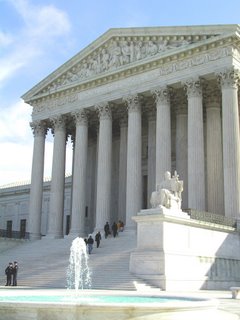 It started in Brooklyn with an angry Civil Court Judge Margarita Lopez Torres trying to get on the ballot for a Supreme Court slot. And it goes next week to the U.S. Supreme Court.
It started in Brooklyn with an angry Civil Court Judge Margarita Lopez Torres trying to get on the ballot for a Supreme Court slot. And it goes next week to the U.S. Supreme Court.
Judge Lopez Torres merely wanted to move up from a lower court (Civil Court) to Supreme Court (New York’s trial court of general jurisdiction). The problem? She couldn’t get on the ballot because the nominations for these elected offices were ordained by political bosses at party conventions, and not the electorate via a primary.
And why couldn’t she get the nomination from the party bosses to get on the ballot? Because, she contends, the bosses that do the picking wanted to use her staff a dumping ground for unqualified patronage.
So she, and nine others, sued in United States District Court, claiming that the voters were deprived of their civil rights by being disenfranchised by New York’s archaic judicial selection practice.
After a 14-day hearing, Judge John Gleeson in the Eastern District of New York (covering Brooklyn, among other local parts) found that Judge Lopez Torres:
“demonstrated . . . that indisputable qualifications for the job and immense popularity among the candidate’s fellow party members are neither necessary nor sufficient to get the party’s nomination. Something different is required: the imprimatur of the party leadership.”
She has now won twice, in U.S. District Court and the Second Circuit Court of Appeals, and oral argument in the U.S. Supreme Court will be heard next Wednesday.
The case centers on this provision of New York’s constitution:
the justice of the supreme court shall be chosen by the electors of the judicial district in which they are to serve.
Judge Lopez Torres says that this means the electorate must chose, for to allow the party bosses to make the picks is to leave power in the hands of the entrenched interests.
The party bosses, on the other hand, claim that this can be accomplished either by primary or party convention, as the legislature has prescribed. This is the position of both the Democratic and Republican machines, as well as the Association of Supreme Court Justices.
There are 33 states that election judges. Only one does not allow for primaries to pick them. New York.
Stay tuned…
Other links:
- Brennan Center for Justice at NYU School of Law (counsel for Lopez Torres, with links and documents)
- New York Judicial Conventions: A Failure of Transparency (American Constitution Society Blog);
- Supreme Court Docket for the case;
- The questions presented;
- Supreme Court Will Review the Way New York Selects Judicial Candidates (New York Times Linda Greenhouse, 3/21/07)